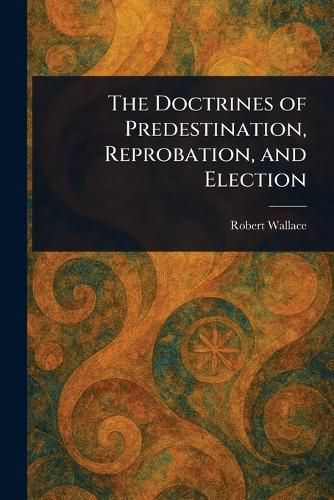Readings Newsletter
Become a Readings Member to make your shopping experience even easier.
Sign in or sign up for free!
You’re not far away from qualifying for FREE standard shipping within Australia
You’ve qualified for FREE standard shipping within Australia
The cart is loading…






This title is printed to order. This book may have been self-published. If so, we cannot guarantee the quality of the content. In the main most books will have gone through the editing process however some may not. We therefore suggest that you be aware of this before ordering this book. If in doubt check either the author or publisher’s details as we are unable to accept any returns unless they are faulty. Please contact us if you have any questions.
Explore the profound and enduring theological questions of fate, free will, and divine sovereignty with Robert Wallace's "The Doctrines of Predestination, Reprobation and Election." This meticulously prepared edition delves into the heart of Christian theology, examining the complex concepts of predestination, reprobation, and election. Wallace's exploration of these doctrines offers a valuable insight into systematic theology and the historical development of Presbyterian thought.
Unravel the intricacies of these challenging ideas as the author presents arguments and interpretations that have shaped religious discourse for centuries. Whether you are a student of theology, a curious reader seeking to understand foundational Christian concepts, or simply interested in the history of religious thought, this book offers a rigorous and insightful exploration of key theological tenets. Wallace's work provides a framework for understanding the nuances of Election and its implications within Christian belief.
This work has been selected by scholars as being culturally important, and is part of the knowledge base of civilization as we know it.
This work is in the public domain in the United States of America, and possibly other nations. Within the United States, you may freely copy and distribute this work, as no entity (individual or corporate) has a copyright on the body of the work.
Scholars believe, and we concur, that this work is important enough to be preserved, reproduced, and made generally available to the public. We appreciate your support of the preservation process, and thank you for being an important part of keeping this knowledge alive and relevant.
$9.00 standard shipping within Australia
FREE standard shipping within Australia for orders over $100.00
Express & International shipping calculated at checkout
This title is printed to order. This book may have been self-published. If so, we cannot guarantee the quality of the content. In the main most books will have gone through the editing process however some may not. We therefore suggest that you be aware of this before ordering this book. If in doubt check either the author or publisher’s details as we are unable to accept any returns unless they are faulty. Please contact us if you have any questions.
Explore the profound and enduring theological questions of fate, free will, and divine sovereignty with Robert Wallace's "The Doctrines of Predestination, Reprobation and Election." This meticulously prepared edition delves into the heart of Christian theology, examining the complex concepts of predestination, reprobation, and election. Wallace's exploration of these doctrines offers a valuable insight into systematic theology and the historical development of Presbyterian thought.
Unravel the intricacies of these challenging ideas as the author presents arguments and interpretations that have shaped religious discourse for centuries. Whether you are a student of theology, a curious reader seeking to understand foundational Christian concepts, or simply interested in the history of religious thought, this book offers a rigorous and insightful exploration of key theological tenets. Wallace's work provides a framework for understanding the nuances of Election and its implications within Christian belief.
This work has been selected by scholars as being culturally important, and is part of the knowledge base of civilization as we know it.
This work is in the public domain in the United States of America, and possibly other nations. Within the United States, you may freely copy and distribute this work, as no entity (individual or corporate) has a copyright on the body of the work.
Scholars believe, and we concur, that this work is important enough to be preserved, reproduced, and made generally available to the public. We appreciate your support of the preservation process, and thank you for being an important part of keeping this knowledge alive and relevant.